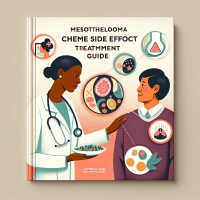Mesothelioma Caused by Asbestos: A Compassionate Guide & Hope
Hello, I’m a registered nurse with over 10 years of oncology experience. I’ve seen firsthand the emotional and physical toll Mesothelioma can take on patients and families. Today, I want to share a comprehensive guide on Mesothelioma caused by asbestos that not only informs but also provides warmth, genuine support, and hope to those affected. Together, we’ll navigate difficult topics with empathy, compassion, and clear information.

Understanding Mesothelioma and the Impact of Asbestos Exposure
Mesothelioma, caused primarily by asbestos exposure, is a rare and aggressive cancer. I understand the shock and confusion that follow such a diagnosis, and I’m here to help you understand every aspect of it. This guide is not just about medical information—it’s about empowering you with the knowledge and support you need to face this challenge head-on.

Diagnosis and Staging: What to Expect
One of the most confusing parts of the journey is understanding the diagnosis and staging process. When a healthcare professional suspects Mesothelioma, several diagnostic procedures may be recommended:
- Biopsies: Procedures such as thoracoscopy or thoracentesis allow doctors to take tissue or fluid samples from the pleura (the lining of the lungs) to confirm the presence of cancer cells.
- Imaging Tests: X-rays, CT scans, and MRIs help determine the location and spread of the cancer.
The staging system for Mesothelioma generally ranges from Stage 1 to Stage 4. Generally speaking:
Stage 1: Cancer is localized, and treatment options are more effective.
Stage 2: The cancer has started to spread locally; aggressive treatment is recommended.
Stage 3: The cancer has spread further, making management more challenging.
Stage 4: Extensive spread where treatment focuses on symptom relief and quality of life.
Please remember, these stages are guidelines. Every patient’s journey is unique, and your healthcare team will tailor recommendations to your specific situation. I urge you to have a detailed discussion with your doctors to fully understand your stage and options.
Treatment Options: Navigating Your Care Journey
When it comes to treatment, there is no one-size-fits-all approach. Your care plan may include surgery, chemotherapy, radiation, or a combination of these options. Here’s an overview of commonly considered treatments:
- Surgery: Removal of affected tissues can be an option, particularly in earlier stages. Procedures vary widely depending on the cancer’s location and spread.
- Chemotherapy: Utilizes drugs that target rapidly dividing cells. Often used in combination with other treatments to control disease progression.
- Radiation Therapy: A non-invasive approach to kill cancer cells and shrink tumors, used to relieve symptoms and improve quality of life.
- Clinical Trials: I often recommend exploring clinical trials, where you can access cutting-edge treatments under strict monitoring. Resources like the National Cancer Institute provide updated trial information.
It is crucial to evaluate benefits alongside possible side effects. Always consult with your oncologist to understand what treatment mix is best for your unique circumstances. I have seen many patients find not just medical treatment, but also renewed hope through understanding and support.
Emotional Support and Coping Strategies
Dealing with a Mesothelioma diagnosis is not purely a medical battle—it’s an emotional journey as well. I truly understand the anxiety, grief, and isolation that can accompany this prognosis. Here are some strategies that have helped me and many others cope during challenging times:
- Seek Mental Health Support: Professional counseling or support groups can provide a safe space to share your feelings. Consider reaching out to local organizations or using online platforms for group support.
- Mindfulness and Relaxation Techniques: Practices such as deep breathing exercises, meditation, and guided imagery can alleviate anxiety. I often recommend simple mindfulness exercises that can be done at home.
- Build a Support Network: Whether it’s family, friends, or fellow patients, sharing your journey can ease the burden. I encourage you to connect with community groups or online forums like our Mesothelioma Support Community.
- Stay Informed and Engaged: Understanding your condition empowers you. Reliable sources such as the American Cancer Society and the Mesothelioma Applied Research Foundation provide up-to-date information.
A Personal Reflection:
I recall moments when the weight of the diagnosis felt overwhelming. In those moments, I found solace in small acts of self-care and knowing that every step, no matter how small, was progress. Remember, you are never alone on this journey.

Practical Guidance: Next Steps and Valuable Checklists
As you navigate your diagnosis and treatment, practical steps can make a significant difference. Below is a simple checklist that I highly recommend discussing with your healthcare provider during your next appointment:
| Question for Your Doctor | Why It’s Important |
|---|---|
| What stage is my Mesothelioma? | Understanding your stage helps tailor the treatment plan. |
| What treatment options are best for my specific situation? | Identifies potential benefits and side effects. |
| Are clinical trials a suitable option? | Gives you access to cutting-edge treatments. |
| How can I manage side effects effectively? | Helps maintain quality of life during treatment. |
| What additional support services are available? | Ensures comprehensive care addressing mental and emotional health. |
This checklist is designed to empower you with questions that may lead to better clarity on your treatment journey. I encourage you to keep it handy and discuss each point with your healthcare team.
Understanding Your Legal Rights and Resources
For many, the diagnosis of Mesothelioma caused by asbestos also brings legal concerns. Transparency is very important to me: while my primary aim here is to offer compassionate support and reliable medical information, I also recognize that exploring legal options can be an essential part of your journey if you have been exposed to asbestos.
Legal resource links such as mesothelioma lawyer, asbestos attorney, and other related resources can help you understand how to approach legal treatment. Remember, seeking legal advice is a companion tool to the medical and emotional support you are already receiving.
Staying Informed and Engaged
Information on treatment guidelines is current as of May 2025. It’s important to continuously update yourself on new discoveries and improvements in treatment. I often recommend checking reputable websites like the National Cancer Institute and the American Cancer Society for the most recent and accurate information.
Additionally, I invite you to explore our other articles on Mesothelioma topics, including our in-depth discussion on Treatment Options & Survival Rates and ways to Support Caregivers During Challenging Times. These resources are designed to ensure you are never left without guidance or support.
Words of Encouragement I’ve Found Helpful
Each day, no matter how challenging, is a step towards healing. I truly believe in the strength within every one of us, and I hope you find courage in the smallest moments of support and understanding. Remember, your journey is unique, and your resilience is unmatched.
Conclusion: Embracing Hope and Taking Action
In conclusion, dealing with Mesothelioma caused by asbestos is a journey that intertwines medical, legal, and deeply personal challenges. I hope this guide has given you not only factual insights but also the emotional support you need. By understanding the diagnosis, staging, and treatment options—and by embracing the strength found in community and loved ones—you can find both clarity and comfort in these trying times.
In these moments, I encourage you to hold onto hope and take actionable steps: speak openly with your doctors, lean on your support network, and, if needed, explore legal avenues with trusted professionals. Together, through honest discussion and genuine empathy, we can navigate this journey.
Next Steps: Consider scheduling a discussion with your healthcare provider about the questions listed above, reach out to support groups, and keep exploring reputable sources for updates. Always remember, compassionate and comprehensive care surrounds you.
Thank you for reading this guide. I’m here with you—every step of the way, sharing my knowledge and care from the heart.






